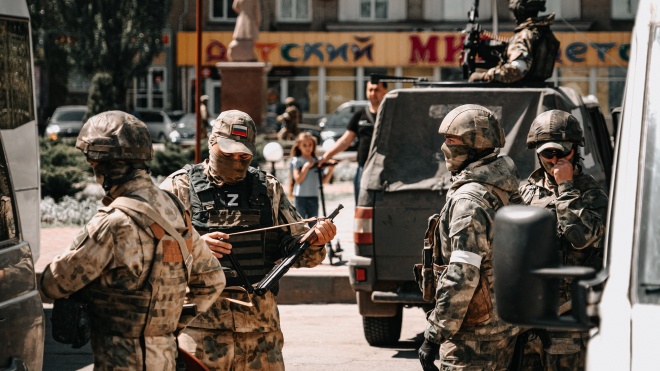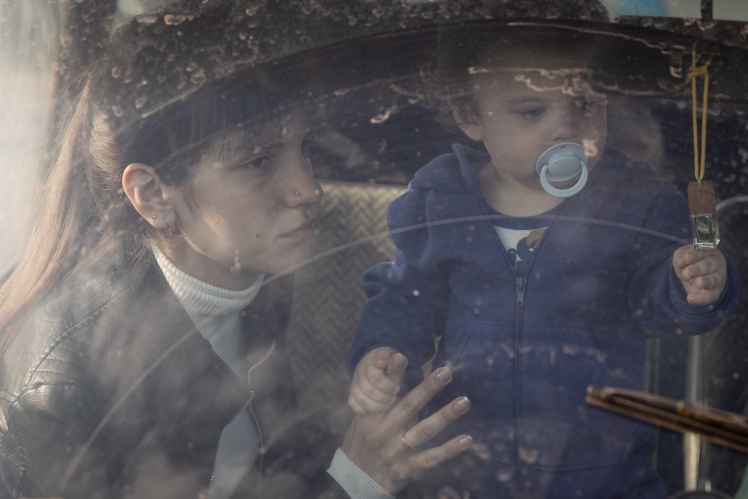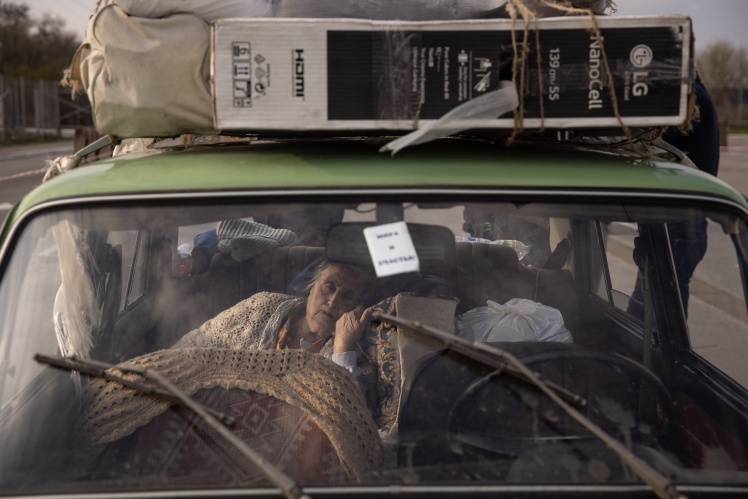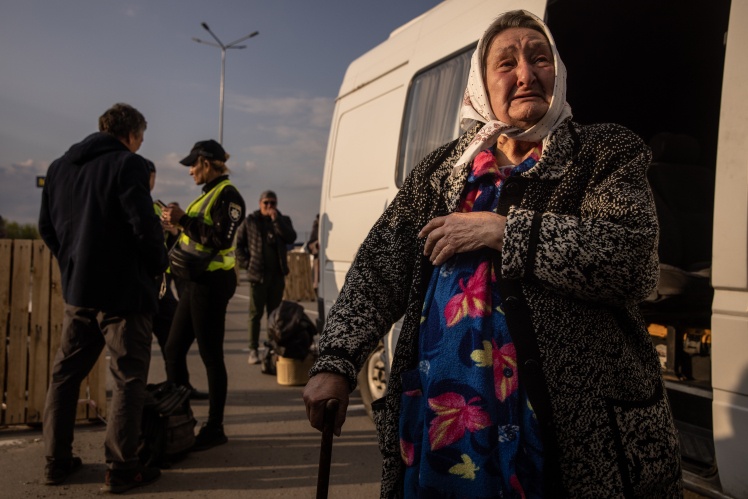What did you do on February 23, the day before the full-scale Russian invasion?
The only thing I remember from February 23 was donating to the Come Back Alive Foundation. For some reason I intuitively wanted to. And then quietly went to bed. I didnʼt have an emergency backpack packed, I didnʼt even think about it. My friends and colleagues all discussed what is possible [regarding the Russian threat] and what to do. But no one thought it would happen.
And how exactly did the invasion start for you?
On February 24, at 5:30 am, I woke up to a loud explosion. They [the Russians] started bombing the military airfield — it is located near residential areas, and the column of smoke was visible. In a panic, I didnʼt understand what was happening, what things to collect, what suitcase, what I may need, where to go. I called my mom. This was the first person I talked to. Se calmed me down at that moment. I packed my suitcase. Then at around 6 am started watching the news. It became clear that a full-scale offensive on Ukraine had begun. Panic broke out in the city. I tried to refuel the car, there were just unrealistic queues at gas stations.
How fast did events in Melitopol develop?
It seems to me that events were developing super fast throughout Ukraine. The Kakhovka Hydro Power Plant was seized at 2-3 oʼclock in the afternoon on February 24. And now itʼs a common fact that on the evening of February 24, Russian tanks were standing at the entrance to Melitopol. I will not say this for sure as I havenʼt seen this myself. The invaders came to the city on February 25. And the first week we lived in fear and uncertainty because our cellular connection began to disappear the next day. We spent the nights in a bomb shelter, sometimes at home. On the 3-4th day of the war, I saw Russian soldiers and tanks passing by on my street, and I realized that the Ukrainian army was no longer in Melitopol.
Did the city authorities get in touch with the citizens?
Yes, they did. Our mayor Ivan Fedorov made video messages every evening. He had live broadcasts on social networks. Local authorities organized their headquarters in the House of Culture because the city council building was seized by the occupiers. Even when the mayor was hunted after, he has one video appeal somewhere in the field. In such extreme conditions, he still went out and talked about what happened in the city, how utilities work now, what the situation is. But such video appeals were there until our mayor was abducted on March 11. And after he was returned from captivity, the authorities continue to inform about what is happening in Melitopol, although he is no longer territorially in the city.
In Melitopol, people have a lot of respect for local authorities. They came to the rally at the district state administration building, where he was being held. After that, the occupiers began to disperse these gatherings with weapons. Prior to that, we held peaceful rallies while the Ukrainian government was still in the city, and the occupiers did not touch people, they just stood there somewhere on the side, as a peaceful march passed by them.
How did the occupiers behave?
I have a clear position to not have any contact with the occupiers. It was like that for all 2 months of life under occupation. I saw them when I went to the store or just walked down the street — I was bypassing them the tenth road. I didnʼt even have eye contact with them, even when, for example, they were standing in line at the store. I didnʼt talk to them.
At first, the occupiers in Melitopol behaved calmly. They did not attack people on the street. They just rested in the local park, fed squirrels there. "Wow, such a cool park!", they were reported to say. Probably, they have never seen such a thing. Also they asked passers-by for cigarettes.
Then they started checking peopleʼs phones. Once Russians took a man with them, just in front of my eyes. When, for example, a person did not remove the tinted glass on the car, they could break the glass. Strict inspections of civilian cars began sometime after the first month of the occupation. Many checkpoints were set up in the city, all men were taken out, cars, documents were checked, and so on. Especially when the guerrilla movement began in Melitopol, Russians became more aggressive, started to check the locals more severely, and kidnappings became more frequent.
One of the flyers that can be seen in Melitopol.
ZODA / Мltpl.City
Were pro-Russian sentiments widespread in Melitopol before the war?
I wouldnʼt say that Melitopol is a pro-Russian city at all. Since 2014 [as the armed Russian aggression towards Ukraine started], the views of the local population have changed greatly. I moved to Melitopol in 2013, so I saw how the pro-Ukrainian position of the majority of citizens is formed. Personally, my opinion is that about 15 percent of pro-Russian citizens remain. And yes, there were collaborators, mostly older people. I worked a lot with young people, they are all pro-Ukrainian. And there is no such thing as people coming out en masse and standing with flags for Russia. On the contrary, there were pro-Ukrainian rallies, and elderly people went on them.
There were people who took Russian humanitarian aid. There were not many of them, though. It seems to me that no one can be blamed in this situation, because many people lost their jobs, looting began, and getting food was difficult. But in so-called "Cossack militia" they introduced in Melitopol, some of them are locals.
And the rest of them are from Russia?
There are a lot of imported people. When Russian humanitarian aid was first distributed, several buses brought people from the Crimea to make a proper TV picture.
It was so symbolic. The main square in the city is divided into two parts. One is where the local fountain, arch and flagpole with the largest flag of the oblast stand. And the second has just benches, a monument to Taras Shevchenko, cars can get close to it. On this second part the truck with the humanitarian woman approached, people stood in line there. And near the fountain the pro-Ukrainian rally was held, people gathered to say that Melitopol is Ukraine and no one is happy with the Russian occupiers here. And when I was at the rally, I saw that there were far fewer people waiting for the humanitarian aid than the pro-Ukrainian protesters.
Melitopol residents protest after Russian forces 'abduct' mayor.
«Babel'»
How did the Russians find collaborators?
At first, as far as I know, the current authorities were pressured to cooperate. All of them refused, many decided to resign. Then Russians looked for collaborators. Initially, they presumed that they would be greeted with bread and salt, but it did not work out, so collaborators was their only way.
What was the situation in the city with food and medicine?
The situation with food has stabilized, with medicine it wasnʼt. On the first day of the occupation, panic broke out and the [electricity in the] city was completely turned off. People began looting. They took everything from ATB, smashed the largest local supermarkets. The next day people started looting not only food. Trying to catch the cellular connection, we traveled around the city, and saw a man coming out of Foxtrot with a washing machine. He tried to bring it home with his bare hands. All this caused the first problem — people who loot had a lot of food in their homes, and those who didnʼt loot were left without it.
Prices have risen for everything. Sugar on the market costs 90-100 UAH per 1 kg, salt — 70-80 UAH. The sausage cost UAH 400 per 1 kg. And meat from local producers who came from the village, cost 110-120 UAH. That is, sausage was more expensive than meat. But somewhere in the second week of the occupation, the food was available, the warehouses began to sell what they had left. Local producers began to bring their goods, people from the villages began to bring meat and eggs. Some companies had coffee left, some were selling cookies. The main cereals were available. So the basic product set could be assembled.
But there was another problem — you couldnʼt pay by card, and canʼt withdraw cash anywhere. At first it was still possible to withdraw cash in the bank, but you need to register in the queue and wait for sometimes 5-6 days. Local speculators figured out that they could withdraw money from cards at interest. That was a new kind of business in the city. First the interest was 2%, then 5%, 10%, and the highest I heard was 12%. But there were people who then took just 1%, which is more or less loyal. And at the dairy you could pay by card, it helped us a lot.
The situation with medicines is worse. For the first 3-4 days, there were long queues in pharmacies, and then they just closed, people bought everything. And it is difficult to bring medicine to the city. We tried to bring medicine, especially Euthyrox for thyroid gland disease. A volunteer carrier was found in Zaporizhzhia, who was able to take the medicines through all the checkpoints to Melitopol. And we are very grateful to everyone and everything that helped bring these medicines intact. There are many stories that Russians at the checkpoints either cut the medicines into pieces, or throw them away, or just donʼt allow them to pass. For some time, we had to give one package of Euthyrox to several people so we could cover as many of them as possible.
Did Russian goods appear in the city?
Yes, the occupiers began to put pressure on local businesses to go shopping in the Crimea. A car with a loudspeaker was driving around the city, there were also leaflets with messages like this: "Local entrepreneurs, go to the Crimea for goods, the road to it is safe and open." At the bazaar, we began to observe cereals of clearly not Ukrainian production. This was the brand "Every day" from a Russian supermarket. There were also goods with the Auchan label, and Auchan has never been in Melitopol. Cigarettes in the city are only from the Crimea. Products of personal hygiene are also only Russian now. There is no Ukrainian toilet paper in Melitopol, only the Crimea-produced. People buy Russian goods because they just have no choice.
Were the payments still in hryvnias when you left?
Yes, only hryvnias, there were no rubles. But I know that on May 1, a new Russian store, Meta, was opened. On the basis of ATB, with all their pallets, boxes, racks, and goods, but the price tags have two prices — in rubles and in UAH.
Yelyzaveta
«Babel'»
How did you overcome the shortage of medicines and products in the city? I know you volunteered.
I had several areas that were within my power and ability. I first tried to volunteer online on the hotline from the Ukrainian Volunteer Service, I processed incoming requests and advised people on how to get help. But the mobile internet was unstable, so I couldnʼt do it all the time. In addition, I moderated a local volunteer chat, inquiries about who needed medicine, food, baby food, and so on.
At the beginning of the war we had three humanitarian aid centers set by the city authorities and local businesses. I came to the humanitarian aid center of my city district, received humanitarian aid, packed it, and gave to people. But the centers set by the city didnʼt work long: after the mayor was taken prisoner, they were closed.
There are two more humanitarian aid centers, which are self-organized by local activists. They work, they help the population. I collaborated with one, we transferred some Euthyrox there. This is one center that I helped to spread information about, to find volunteers for them. And we have a second center, it was organized by local activists who had previously helped children at a boarding school near Melitopol.
We received local support and purchased 100 food kits for IDPs. But in fact, I was quite scared, because activists were abducted in the city, so I didnʼt talk about my activity very much.
Could you please tell more about kidnappings? What do you think they wanted from local activists in general?
They wanted to intimidate the local population. Like, if you do something, if you resist [the occupation] in some way, then repression can come to you. Volunteers who bring food to grandmothers have not been touched yet. But there are heads of public organizations, there are volunteers who since 2014 have worked with [the Russian-Ukrainian] war veterans, for example. They [the Russians] initially targeted these people. They tried to sway such volunteers to their side so that the local population could see that there was no one to resist [the occupation].
There was a kidnapping of two young guys, who in 2014 were very pro-Ukrainian, they tore off St.George ribbons. They were brutally interrogated, their families were threatened. One guy was forced to record an apology video under the barrel of a machine gun. And then they [Russians] used it in a propaganda video, which they will probably air on Russian TV channels.
By the way, in Melitopol, about three weeks after the occupation, there was only Russian broadcasting. Radio — only Russian, TV channels — only Russian, and cellular communication was periodically cut off. We turned their propaganda on several times, they have a radio called Pobeda, and there was just unrealistic nonsense. What I heard from their programs is that Ukraine is a leader in selling children. Children are trafficked, one child costs $70 thousand and China, Israel, and the USA buy them from us. I donʼt know how people believe that.
Are locals gradually recognizing the authority of the occupiers, or this is not happening?
People just got used to the fact that the military and vehicles drive nearby. As for the acceptance of the occupiers, that itʼs already the government and we will live under Russia — there is no such thing. In my circle of people, all are disgusted by what is happening. They donʼt accept it, they are tired of it, and they want to see the Ukrainian flags [around the city].
We have a flagpole on the [main] square, and back in March a large Ukrainian flag hung there. And then the flagpole was cut. It was a very big blow to the local population. A friend said: “I was so offended that our flag was taken down. When the flag is flying, for me it is hope, I believe [that everything will come back]." And when they hung their tricolor rag on the House of Culture, it was also very difficult for the locals.
There was another case when they put a KAMAZ truck with a [Russian] flag near the plant. Very quickly, a Ukrainian flag appeared on the checkpoint of this plant, local people hung it so that the Russians could see it. These moments show that there is no acceptance of the Russian occupiers. People fight, hand out leaflets, which are even handwritten sometimes.
A girl near the arch in Melitopol, where the occupiers placed Soviet symbols, May 1, 2022.
Getty Images / «Babel'»
Is there faith in the Ukrainian army among the townspeople?
People are waiting [in liberation], people are believing. While I was in the city, I believed and waited for it every day, and now I stay with this faith. I understand that the priorities in the Ukrainian army now are a little different — there are battles in the Donbas, near Kharkiv. Our army is strong, smart, and thinks strategically. The local population also believes in it. Some people are, of course, scared. They succumb to the herd instinct. They write in the local group chats that there should be no fighting, because "a second Mariupol will be here, it will be [a massacre] like in Bucha." Many people are afraid to comment because it is still an occupied city, and security must come first. It is unknown who is viewing these comments, it is an open social network. Therefore, it seems to me that people just believe [in liberation] quietly and wait for it.
How did you decide to leave the city?
At the beginning of the occupation, I firmly decided for myself that I would not go anywhere, I would wait for the Ukrainian army. This is my house, and, as they say, at your home even the walls help you. I didnʼt want to go anywhere, even when my friends and acquaintances started going [out of Melitopol]. But then there were some turning points. The savings have the tendency to run out. I work remotely, I had no [Internet] connection, so I could not work. Then they [the occupants] began to import Russian goods en masse. And I have a principle that I donʼt buy the goods of the aggressor country because this supports the army, which kills our people. I just couldnʼt buy them. And my opinion has already changed that I need to leave. After all, I was just scared, because Iʼm a pro-Ukrainian activist and havenʼt left home for the last 2-3 weeks. In addition, I did not clean my phone, and there I have all the news, correspondence, and a lot of volunteer chats. I went outside without a phone, because if they look at my phone, they will detain me. I wear a [Ukrainian] coat of arms around my neck, and I have a vyshyvanka ornament tattooed on my arm. Now that I have left Melitopol, I am helping the centers that work in the city.
And how easy was it to leave?
We left three weeks ago normally and quickly. We arrived in 6 hours in Zaporizhzhia (before the war, the road there took 1.5-2 hours). We passed 28 checkpoints, there was a lot of moral pressure. The “DPR” members were especially oppressive, saying that "Ukraine has been bombing Donbas for 8 years", that we have to wait a bit, and in Melitopol "everything will be cool", like in the “DPR”. They said: “Where are you going? Are you going to war?” We went in a group: my boyfriend, me, and a family with children. Soldiers at the checkpoints started saying, “Where are you taking your children? You donʼt love them at all."
I erased as much data from my phone as possible. You canʼt erase everything completely, because itʼs suspicious, they [the occupants] check everything. There were checkpoints where they donʼt even look at the residence permit, like “just go on”. And there are checkpoints where they take people out, undress them, ask them questions, press morally, and check all passports, residence permits, laptops. Men were taken out, checked, they were subjected to even worse moral pressure than women. But still, we arrived normally.
There were no shellings. But you go [on the road], and thereʼs a mine, thereʼs a shell, thereʼs a car completely bombed. When you look at these pictures on the Internet, you somehow do not perceive it so much, and when you drive past a broken armored personnel carrier, a little different reality comes to your mind.
Evacuation from Mariupol and Melitopol to Zaporizhia, April 22 — May 2, 2022.
Getty Images / «Babel'»
Were men searched for tattoos, bulletproof vest marks, and so on?
Yes. My boyfriend was taken out on almost every checkpoint. They [the occupants] looked at the shoulders, arms, legs, and knees. If there is a tattoo, they ask what it means. They also checked the phone: photographs, SMS, and calls. Some soldiers at the checkpoints were good at working with an iPhone. And some Russians even found it difficult to unlock it. We also had a backpack with the words "Your strength is to act together", written in Ukrainian. At one checkpoint, the Russian was able to read it normally, that is, someone understood the Ukrainian language. Unless, of course, itʼs Buryat, as it was difficult to speak even Russian with them.
People leaving the occupied territories describe how they first saw the Ukrainian checkpoint. Was it an emotional moment for you?
I almost cried, honestly. When we passed, the driver told us: "Thatʼs all, we passed the last Russian checkpoint, Ukraine is ahead." And I just sit by the window like a child going to sea. Like when is the sea coming? And when we were getting to the first [Ukrainian] checkpoint, I said to the guy: "Look, look, our flag is flying, our soldiers are already there." It was like a long-awaited birthday present for me.
Translated from Ukrainian by Anton Semyzhenko.
Support Babel:🔸donate in hryvnia 🔸in cryptocurrency 🔸via PayPal: [email protected].




